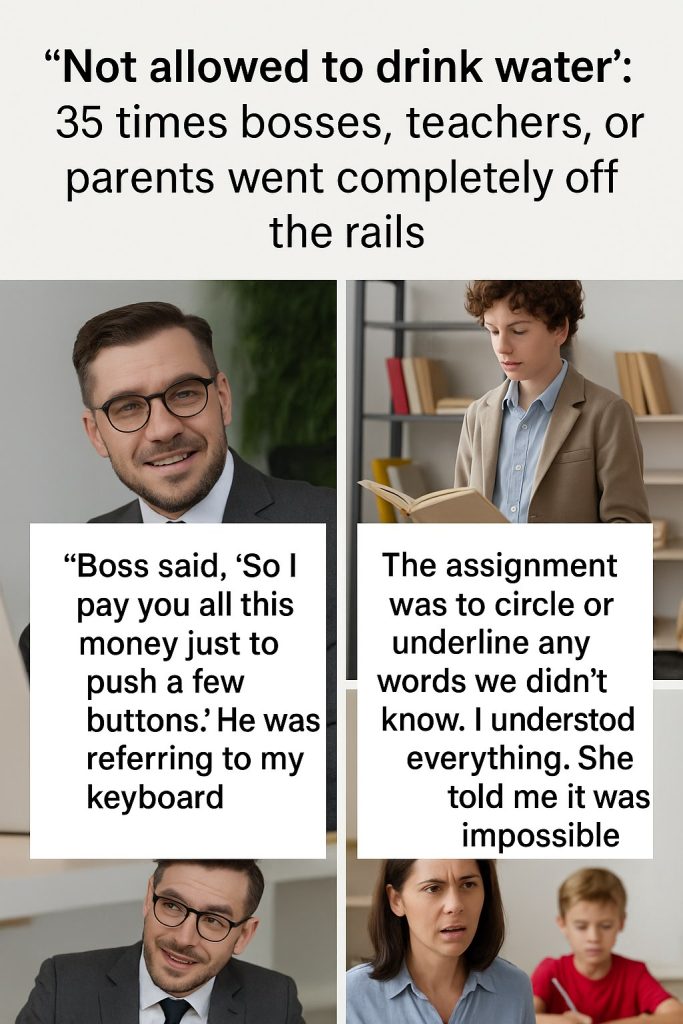In 2024, a series of viral stories have brought renewed attention to a disturbing but often overlooked issue: authority figures—whether bosses, teachers, or even parents—enforcing restrictions on drinking water. Instances where individuals were explicitly told they were “not allowed to drink water” during work, school, or home have ignited public outrage and sparked heated debates about basic human rights and workplace or educational ethics.
What might seem like an exaggeration or an old workplace cliché has become all too real for many. Across social media platforms, users have shared more than 30 documented experiences where supervisors or guardians took the controversial stance of prohibiting water breaks, causing discomfort, health risks, and sometimes even disciplinary actions. These accounts have been strikingly similar across various environments—from offices to classrooms to homes—exposing an alarming pattern of neglecting employee, student, or child well-being in favor of rigid control or misguided productivity concerns.
One recently shared example involved a corporate setting where an employee described their manager saying: “So I pay you all this money just for you to waste time drinking water?” This boss’s dismissive attitude towards a fundamental physiological need ignited a firestorm of criticism online, with numerous others responding that they faced comparable or even harsher treatment. Some described supervisors who limited water access during long shifts under the premise that breaks—even to hydrate—were “time theft.”
In educational settings, teachers have reportedly restricted students from drinking water during lessons, falsely citing concerns about classroom disruptions or repeated bathroom breaks. One teacher allegedly told a student, “You’re not allowed to drink water unless it’s recess,” even though the student presented a medical note indicating a need for regular hydration. Stories from parents enforcing water restrictions at home have also emerged, often justified under behavioral or disciplinary rules, further highlighting the pervasive nature of this problem.
The negative impact of such policies and attitudes is profound. Medical experts warn that denying regular access to water can lead to dehydration, decreased cognitive function, headaches, and in some cases, serious health complications—particularly for children, older adults, and those with medical conditions. Several occupational health specialists emphasize that the right to hydrate freely should be regarded as a basic and non-negotiable requirement.
Public reaction has been swift and condemning. Online conversations have surged, with hashtags related to water restrictions trending as people call out outdated and harmful management styles. Many commentators stress that allowing individuals the simple and essential act of drinking water improves productivity, attentiveness, and overall morale, rather than detracting from it.
In response to this outcry, some companies and schools have started revisiting their policies. Progressive organizations are introducing clearer guidelines ensuring that water breaks are integrated into daily schedules and that hydration facilities are accessible. Awareness campaigns are being launched to educate leaders about the importance of hydration for health and performance.
Despite these positive steps, the recurring nature of these stories in 2024 spotlight a broader cultural issue: the persistence of authoritarian approaches that prioritize rigid discipline or perceived efficiency over human dignity and health. The documented 35 cases highlight a need for continued advocacy and reform.
In a world increasingly focused on employee well-being and inclusive education, it is shocking that something as fundamental as access to water remains a point of contention. As more people share their experiences, the hope is that this will spark meaningful change, ensuring that no one is told they are “not allowed to drink water” ever again.



